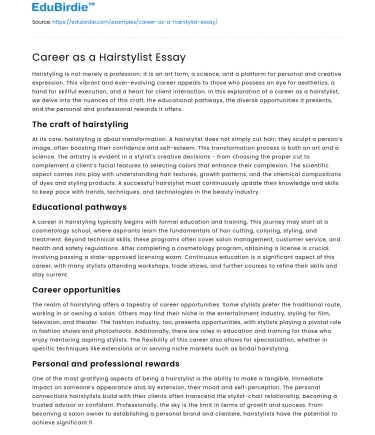Hairstyling is not merely a profession; it is an art form, a science, and a platform for personal and creative expression. This vibrant and ever-evolving career appeals to those who possess an eye for aesthetics, a hand for skillful execution, and a heart for client interaction. In this exploration of a career as a hairstylist, we delve into the nuances of this craft, the educational pathways, the diverse opportunities it presents, and the personal and professional rewards it offers.
The craft of hairstyling
At its core, hairstyling is about transformation. A hairstylist does not simply cut hair; they sculpt a person’s image, often boosting their confidence and self-esteem. This transformation process is both an art and a science. The artistry is evident in a stylist's creative decisions - from choosing the proper cut to complement a client’s facial features to selecting colors that enhance their complexion. The scientific aspect comes into play with understanding hair textures, growth patterns, and the chemical compositions of dyes and styling products. A successful hairstylist must continuously update their knowledge and skills to keep pace with trends, techniques, and technologies in the beauty industry.
Educational pathways
A career in hairstyling typically begins with formal education and training. This journey may start at a cosmetology school, where aspirants learn the fundamentals of hair cutting, coloring, styling, and treatment. Beyond technical skills, these programs often cover salon management, customer service, and health and safety regulations. After completing a cosmetology program, obtaining a license is crucial, involving passing a state-approved licensing exam. Continuous education is a significant aspect of this career, with many stylists attending workshops, trade shows, and further courses to refine their skills and stay current.
Career opportunities
The realm of hairstyling offers a tapestry of career opportunities. Some stylists prefer the traditional route, working in or owning a salon. Others may find their niche in the entertainment industry, styling for film, television, and theater. The fashion industry, too, presents opportunities, with stylists playing a pivotal role in fashion shows and photoshoots. Additionally, there are roles in education and training for those who enjoy mentoring aspiring stylists. The flexibility of this career also allows for specialization, whether in specific techniques like extensions or in serving niche markets such as bridal hairstyling.
Personal and professional rewards
One of the most gratifying aspects of being a hairstylist is the ability to make a tangible, immediate impact on someone’s appearance and, by extension, their mood and self-perception. The personal connections hairstylists build with their clients often transcend the stylist-chair relationship, becoming a trusted advisor or confidant. Professionally, the sky is the limit in terms of growth and success. From becoming a salon owner to establishing a personal brand and clientele, hairstylists have the potential to achieve significant financial success and recognition in their field.
Conclusion
In conclusion, a career as a hairstylist is multifaceted and rewarding. It combines creativity, technical skill, and interpersonal interaction in a unique blend that offers numerous pathways for professional growth and personal satisfaction. A career in hairstyling can be an exciting and rewarding path for individuals passionate about beauty and helping others feel and look their best. In essence, the journey of a hairstylist is characterized by constant learning, adaptation, and creativity. It's a career that shapes the way individuals see themselves and contributes significantly to fashion and cultural trends, reflecting the ever-changing tapestry of society.






 Stuck on your essay?
Stuck on your essay?

